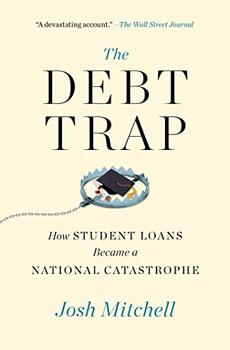Summary | Excerpt | Reviews | Beyond the Book | Readalikes | Genres & Themes | Author Bio

How Student Loans Became a National Catastrophe
by Josh Mitchell
Elected leaders thought they were helping families by putting more money in their hands. The problem is Congress failed to provide guardrails to ensure borrowers weren't overcharged for their degrees. The program became a profit center for schools and the student loan industry, which put none of their own money at risk as they encouraged students to sign up for tens of thousands of dollars in debt.
Over the decades Congress passed a series of laws that created perverse incentives for lenders, schools, and borrowers alike. The student loan program is the quintessential form of crony capitalism. It privatized profits and socialized losses. In an echo of the housing bubble, all the risk fell to students and their families, who have been told repeatedly that college and grad school are safe and necessary investments. The narrative of higher education as a ticket to the American Dream fueled the exploitation of good intentions by bad actors.
The most important actor in the evolution of the student loan system was Sallie Mae, a quasi-public agency that Congress created in the 1970s to kick-start the student-loan industry. The company served as a money laundering operation—as its main congressional defender, the late Michigan congressman Bill Ford, once described it—and the money it laundered was taxpayers'. Sallie Mae, under an agreement with Congress, funneled untold billions of public dollars to schools and banks, and itself made enormous profits off the whole operation.
The actors who have benefited the most—banks, Sallie Mae, and universities—shaped that system, hiring armies of lobbyists to push for laws that improved their bottom lines while often leaving borrowers in the lurch. Universities employ more lobbyists than any other industry except pharmaceuticals and technology. They have fended off attempts at federal regulation that would have prevented many borrowers from getting into financial trouble.
College presidents have done quite well from the system. Eighty-one university leaders, including 17 at public colleges, earned more than $1 million in 2019. Wall Street, too, made a killing, earning tens of billions of dollars from the student loan program each year by investing in for-profit colleges that left students with low salaries and deep in debt.
Congress and multiple U.S. presidents encouraged borrowing while ignoring red flags that the loans set up borrowers to fail. Congress used shoddy accounting to mask the consequences of the reckless lending, engaging in behavior that would be criminal in the private sector. All of the practices that the government accused private lenders of in the mortgage market—predatory lending, deceptive math, willful ignorance—occur routinely in student lending.
How could this happen? This book tells the story of how we got here, starting from day one of federal student lending in the late 1950s. It chronicles how the program evolved into a grand social experiment in the 1960s, how it unleashed an era of runaway tuition in the 1980s and '90s, how Sallie Mae became a Wall Street behemoth and the biggest student lender in the early 2000s, and how investors stoked the for-profit college crisis in the 2000s.
Many people—more than are included in this book—played a role in creating this mess. Most had good intentions, putting their faith in higher education and student loans as they sought to uplift families and the country. Many now say they got it wrong. The late economist Alice Rivlin, the first head of the Congressional Budget Office and first female White House budget director, provided the ideological framework for the student loan program. As part of the Lyndon Baines Johnson administration in the late 1960s, Rivlin oversaw a landmark report calling for a major expansion of student lending.
The idea was to help the poor and the middle class, through scholarships and student loans, move up in a rapidly maturing economy, and to reduce poverty and income gaps in American society.
Excerpted from The Debt Trap by Josh Mitchell. Copyright © 2021 by Josh Mitchell. Excerpted by permission of Simon & Schuster. All rights reserved. No part of this excerpt may be reproduced or reprinted without permission in writing from the publisher.
Your guide toexceptional books
BookBrowse seeks out and recommends the best in contemporary fiction and nonfiction—books that not only engage and entertain but also deepen our understanding of ourselves and the world around us.